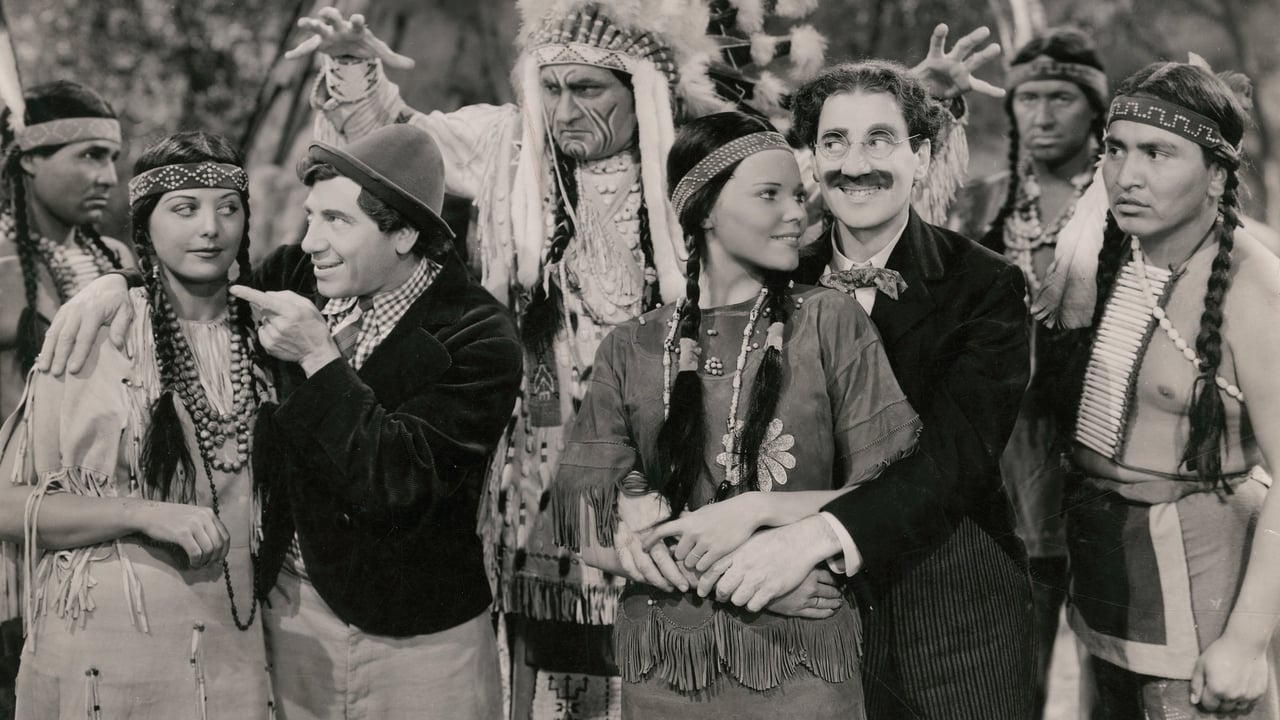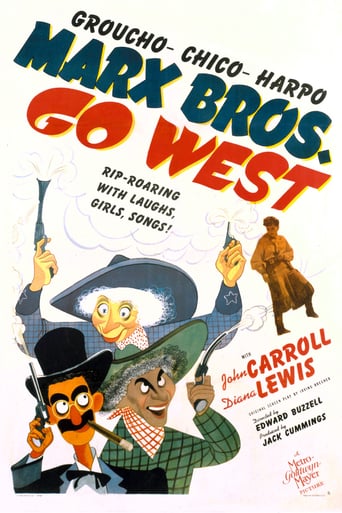

Good concept, poorly executed.
... View MoreDid you people see the same film I saw?
... View MoreThis story has more twists and turns than a second-rate soap opera.
... View MoreThe film's masterful storytelling did its job. The message was clear. No need to overdo.
... View MoreS. Quentin Quale (Groucho Marx) is a con-man heading west. He encounters seemingly bumbling brothers Joseph (Chico Marx) and Rusty Panello (Harpo Marx) in a train station and ends up losing his money to them. The brothers meet old miner Dan Wilson who hasn't found gold for 40 years on his property, Dead Man's Gulch. They lend him $10 and get the property as collateral. Meanwhile, Terry Turner arranges the sale of the property to the railroad for $50k. The Turners and Wilsons are rivals. Terry hopes to ease the rivalry with the sale and marry Dan's granddaughter Eve Wilson. Saloon owner Red Baxter receives a telegram to get the property. The boys write an IOU on the back of the deed to pay for beer at Red's saloon.This is full of the Marx brothers antics. Chico plays the piano. Groucho is the heel. Harpo doesn't talk and finds an usual harp with the Indians. This comes after a string of iconic Marx brothers comedy hits. These things come in cycles and the guys may be wearing out their welcome. They haven't changed their verbal gags and there are still songs. The last act is all action on a train and that's plenty of fun. For Marx fans, this should still hit the spot.
... View MoreAs a Marx Brothers comedy, "Go West" is in my opinion great, considerably better than the critics make it out to be. Although a period film, it is quite surprising to find Harpo and Chico (pronounced "Chicko") wearing their traditional contemporary costumes about midway through. Anyhow, right from the get-go, Groucho is up to his usual wisecracking, and the other two maniacs are up to their customary con-artist shenanigans. AND the two romantic leads (John Carroll and Diana Lewis) are quite appealing to me and hardly dull, contrary to what other critics have stated. Throw in a couple of heavies (every Western film needs them) like Walter Woolf King and Robert Barrat as a pair of money-hungry land grabbers, and you have the foundation for a remarkable Marx Bros. action/comedy/romance.Here are my personal favorite scenes from "Go West" (DO NOT read any further if you have not yet seen the film). The fabulous extended locomotive sequence at the end of the picture boasts a fair number of clever gags, among them being the train taking out a house while a carpenter works on the roof; the Marx Bros. chopping up the train cars and "borrowing" baggage for kindling; and Rusty Panello (Harpo) stretching himself to rejoin two cars that have separated. For a much less intense offering, Terry Turner (Carroll) and the Marx Bros. sing "Ridin' the Range" with Rusty accompanying on harmonica and S. Quentin Quale (Groucho) on guitar, because what would a Marx Bros. film be without music? Speaking of music, Chico (as Rusty's brother Joseph Panello) does well as always with his unique ivory-tickling technique, but I've never seen anybody play the piano with an orange! Quale offers a necklace to a beautiful Native American girl, but she bluntly replies, "No like. Want Cadillac Sedan," thus forcing Quale to conclude that she has not spent much time on a reservation; he then introduces Rusty as the tribe's new totem pole, to which Harpo incorporates his ever famous Gookie face. Speaking of Native Americans, "Go West" is in my opinion most offensive in its treatment of them, but Harpo thankfully makes up for this when his character Rusty wins the chief's respect by allowing him to play flute with Rusty's jazzy harp. During the rollicking stagecoach ride, a woman complains about "the jerks in the coach", prompting the Panello brothers to react accordingly. Quale and Joe Panello are hilarious during their off-camera drunken banter while Rusty cracks a safe. Rusty performs a hilarious showdown with Red Baxter (Barrat). And finally, "Nine dollars change, please." Whew! I wrote a lot of details about "Go West", didn't I? Maybe I shouldn't have been so specific, but I just wanted to convey my love of this film and my conviction that it is not the big letdown that others claim it to be. See it for yourself and catch a lot of laughs.
... View MoreLike so many comedians before them, and so many who would follow, The Marx Brothers spoof western clichés in this enjoyable late MGM feature. Not a classic Marx Brothers film along the lines of "Duck Soup" or "A Night At The Opera," but it is a definite improvement over their weak previous film "At The Circus." The film starts very well with con man Groucho getting conned by Chico and Harpo instead. Sadly, despite many good moments, the film soon descends into sentimental MGM malarkey. Discarding the zany, anarchic spirit of their Paramount features, MGM worked to tame the brothers by focusing their activities on laudable goals, like, in this case, helping a nice couple from being cheated out of valuable land. Fortunately, the final reel of this film, featuring the train chase, is hilarious. A nice effort. Well worth a look.
... View MoreThe most significant thing about Go West is that Buster Keaton was an uncredited writer on this film. He also was on A Night at the Opera but the Keaton touch is more difficult to discern there.The Marx Bros. have a reputation as verbal comics (Harpo excluded, of course), but one must note many of their best scenes are visual. The mirror sequence in Duck Soup is the prime example. Others include the unpacking scene in A Night in Casablanca, the "massacre" that ends Animal Crackers, large parts of the football game (and the final marriage scene) in Horse Feathers. Even something as minor as Groucho flicking ashes into a call pipe to the engineers of the ship in Monkey Business shows just how important the visual can be, even for Groucho.Keaton, of course, was virtually 100% visual. Occasionally there are subtle jokes in the subtitles of his films (His "Can you describe it?" to a woman looking for a lost dollar bill in Sherlock Jr. is an example), but that's about it.What this means is that a Marx Brothers film partly written by Buster Keaton is not a combination of irreconcilable ideas. Keaton's contributions here do not become crystal clear until the last 15 minutes of the film, the climactic train chase.There are lots of similarities between gags from Our Hospitality (the train leaving the track yet still running), Steamboat Bill Jr (Harpo escapes being run over as the train with a house stuck on the front comes at him by opening a front door, then opening a back door, calling to mind the falling building facade Buster faced in the earlier film) and, of course, the General (chopping up the train for firewood), but the thing that's most noteworthy about The General is just how long Keaton can sustain a chase (it virtually runs the entire film), and the Go West sequence is marvelously sustained comedy.The Big Store also has the Brothers doing physical shtick, but the absence of the surreal makes them look like nothing more than slightly more sophisticated three stooges. They are not three stooges here. Harpo uses the wheel of the train to sharpen an ax, kerosene instead of water is used to douse an engine's fire resulting in it taking off at hyper speed, Groucho is buried beneath an avalanche of popcorn put in the train's fire as fuel. Something like watching the train go off the track and then go into a circle as merry-go-round music plays just seems like pure Keaton and pure Marx.Although not Duck Soup (what is, other than Duck Soup?) the film to me is the best thing they did between A Night at the Opera and A Night in Casablanca. Groucho's character is more along the lines of his Paramount persona than his avuncular Day at the Races one. He finally seems totally unfettered again. Harpo, too, is unfettered (although maybe it would be better to say unleashed). He's given a large number of bits where he's not depending on Chico or anyone else to bring off the gag. And Chico seems almost as delightfully corrupt as he is in the Cocoanuts.The film is slowed by a few too many musical numbers, too much of a sappy romantic subplot about families in feuds. and the scenes among stereotypical Native Americans are diminished by a few too many "ugh"'s and references to "the red man." Yet the pacing is fast enough, and delivery and lines sharp enough, to keep all the balls up in the air to the end. This is the first film since Duck Soup to unequivocally seem like the Marxes as they would play it in a Paramount film (A Night in Casablanca would be the last).And this is all lead-up to the final train sequence which, as any climax must be, is the best one of the film.More than the scene in Limelight where Keaton and Chaplin do a comedy routine (an opportunity Chaplin seems to have tossed with mediocre gags), Keaton's working with the Marx Brothers is a remarkable moment in film history, and one that worked well enough to redeem alater comedy of the Marx Brothers.
... View More